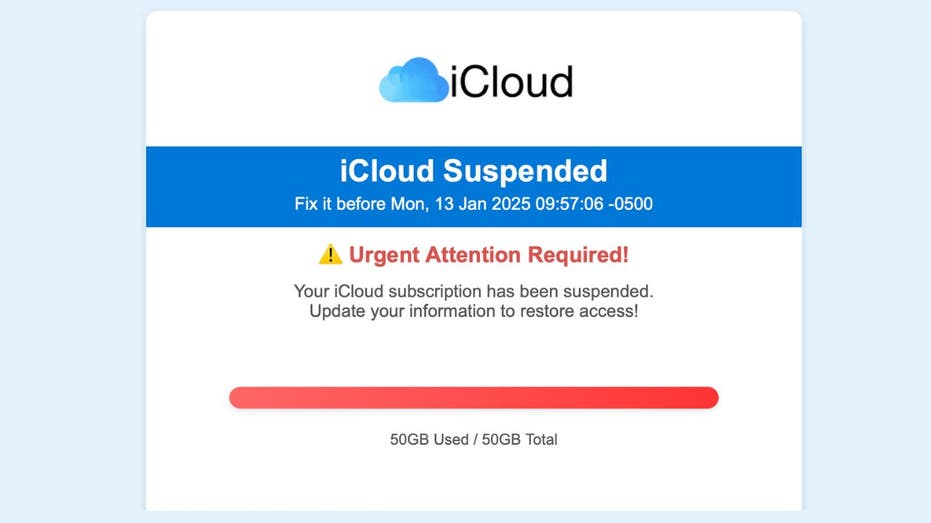- by foxnews
- 05 Apr 2025
Don't fall for that sneaky iCloud storage alert in your inbox
Beware of iCloud scams using urgent messages. Tech expert Kurt "CyberGuy" Knutsson helps you spot the red flags to protect yourself.
- by foxnews
- 12 Feb 2025
- in technology

iCloud scams are becoming increasingly sophisticated, targeting unsuspecting users with urgent messages about their accounts. Our team recently received two suspicious iCloud emails. We want to share our experience and provide comprehensive steps on how to identify and protect yourself from these scams.
iCloud scams typically follow a pattern designed to create a sense of urgency and fear. Let's break down the two emails our team received below. Here is the urgent wording that the scammers used, "Payment Failure for iCloud Storage Renewal" and "iCloud Suspended. Fix it before Mon, 13 January 2025." Both emails share common characteristics of phishing attempts, including urgent language, threats of account suspension or data loss, requests to update payment information, links to external websites and vague or incorrect account details. These emails are crafted to look legitimate, often mimicking Apple's branding and tone. However, they contain several red flags that indicate they are scams.
To protect yourself from falling victim to these scams, look out for these telltale signs:
If you receive a suspicious email claiming to be from Apple or iCloud, follow these steps:
Follow these steps if you think you may have fallen for an iCloud scam.
1) Change your Apple ID password immediately: Ensure you create a strong, unique password that you haven't used on other accounts.
2) Check for any unauthorized changes to your account settings or payment information: Go to account.apple.com and review any devices, personal information or security settings that look unfamiliar.
3) Contact Apple Support directly through official channels for assistance: Forward the suspicious email to reportphishing@apple.com or abuse@icloud.com to help Apple track and block these scams.
4) Monitor your financial accounts for any suspicious activity: If you provided payment information, cancel and replace your credit card immediately and pay close attention to even small unauthorized charges.
Remember, Apple will never ask you to provide personal information, passwords or security codes via email, text message or phone call. If you're ever in doubt about the legitimacy of a communication from Apple, always err on the side of caution and contact Apple directly through their official website or support channels. By staying vigilant and following these guidelines, you can better protect yourself from iCloud scams and keep your personal information secure. Don't let the urgency of these messages cloud your judgment. Take a moment to verify before you act, and you'll be much safer in the long run.
Follow Kurt on his social channels:
Answers to the most asked CyberGuy questions:
New from Kurt:
Copyright 2025 CyberGuy.com. All rights reserved.
- by foxnews
- descember 09, 2016
Excavation near site where Jesus was crucified and buried results in ancient discovery
Proof of ancient olive trees and grapevines, consistent with a Bible verse, has been found at the Church of the Holy Sepulchre in Jerusalem, an archaeologist confirms.
read more





